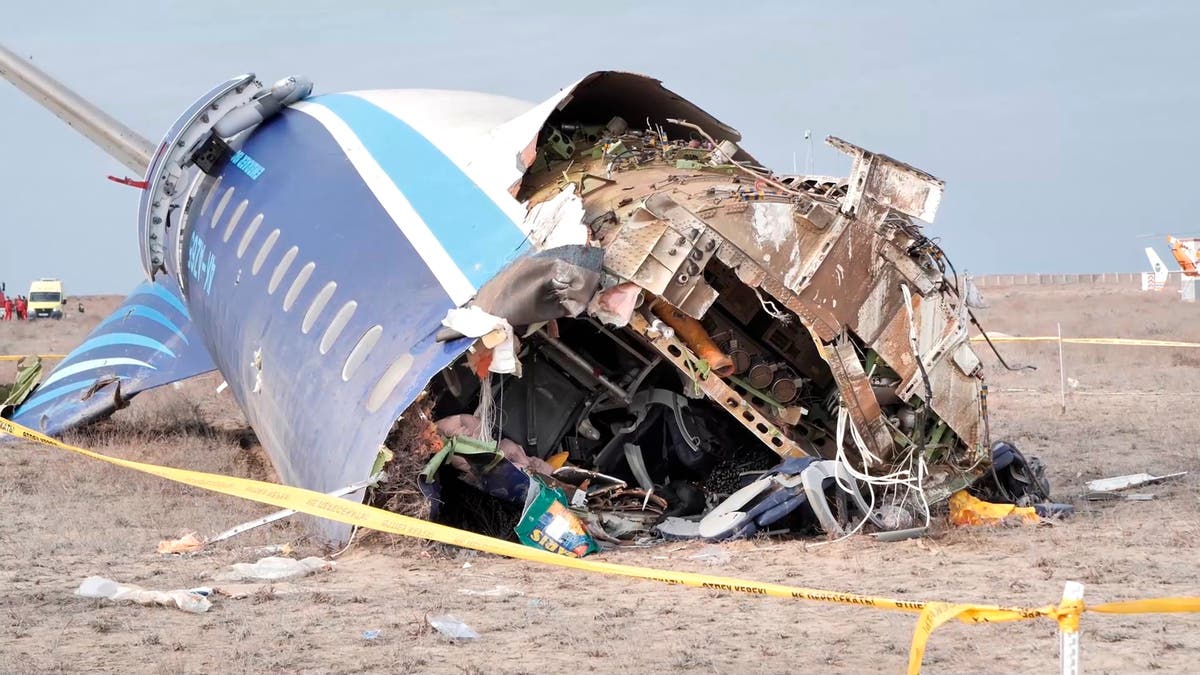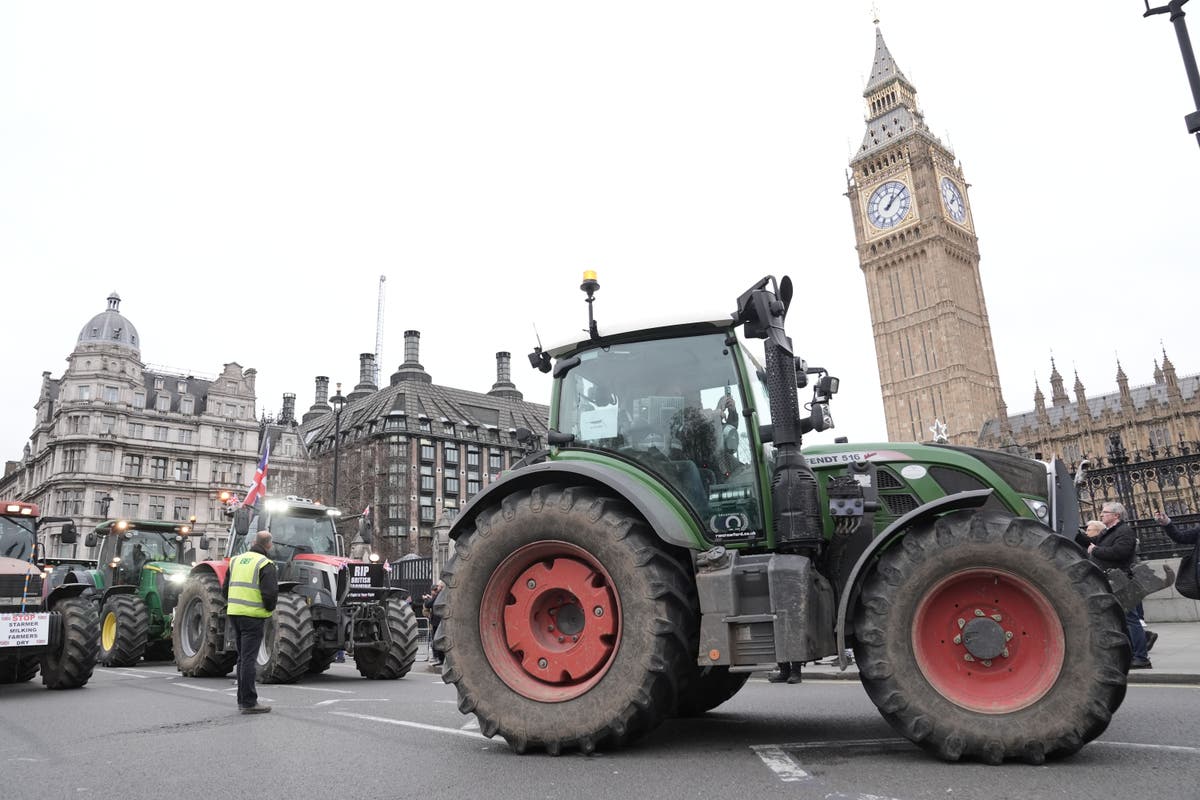World
Chagos Islands: UK offers Romania move to stranded migrants
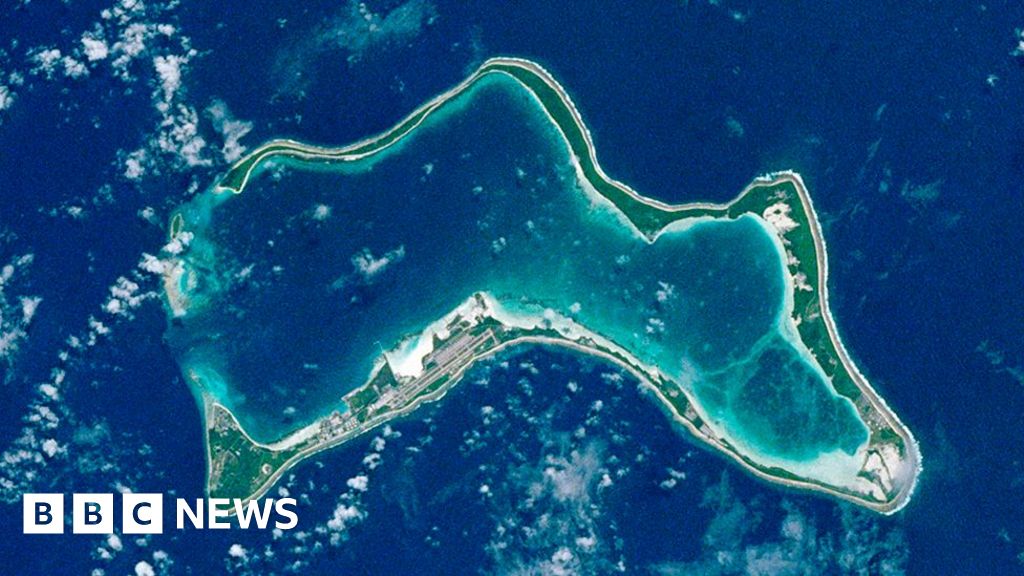
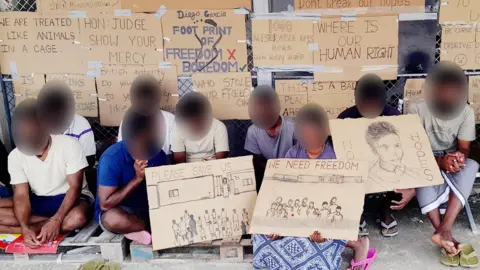 BBC
BBCThe UK has offered dozens of stranded migrants, held for years in a camp on a secretive UK-US military island in the Indian Ocean, a temporary move to Romania.
After six months, they could be moved to the UK. Others in the group are being offered financial incentives to go to Sri Lanka where they say they face persecution, the BBC has learned.
In 2021, dozens of Tamils became the first people ever to claim asylum on Diego Garcia after their boat ran into trouble.
The territory’s unusual status led to a long legal dispute, with the UK government saying that bringing them to Britain risked creating a “backdoor migration route”.
A Foreign Office spokesperson said ministers had been working to find a solution which protects the welfare of migrants and “the integrity of British territorial borders”.
Relocating the most vulnerable migrants while their legal claims are processed would offer them “greater safety and wellbeing”, the spokesperson said.
The offer to the migrants, by British officials on the island on Tuesday, came after the UK announced it was handing sovereignty of the British Indian Ocean Territory (Biot), which includes Diego Garcia, to Mauritius. The military base, however, will remain on the island.
The BBC gained unprecedented access to Diego Garcia last month to attend a court hearing over whether the group had been unlawfully detained in a small fenced camp, which is guarded by private security company G4S.
A judgement in the case is expected soon.
The British government has argued that the refugee convention is not in force on Biot because it is “constitutionally distinct” from the UK, though it is administered from the Foreign Office in London.
Instead, the Biot administration established a separate process to determine if the Tamils could be returned to Sri Lanka or be granted international protection – which the UN says is akin to refugee status.
There are currently 56 Tamils still on Diego Garcia. A further eight are currently in Rwanda after being transferred there for medical care after self-harm or suicide attempts.
Most of the migrants are awaiting decisions on their international protection claims or appealing rejections. In total, eight have been granted international protection.
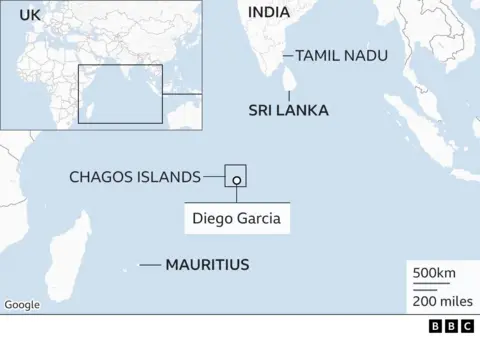
Over the summer, the top official running the territory, Paul Candler, requested that the government bring all of the migrants to the UK because of what he described as a “dangerous and unsustainable situation” in the camp amid mass incidents of self-harm.
Mr Candler stepped down a month later, saying in a resignation letter, obtained by the BBC, that he had found the “migrants situation increasingly difficult” and “the personal leadership demands that this has placed on me increasingly challenging”.
Speaking to the migrants in the camp on Tuesday morning, Biot’s acting commissioner Nishi Dholakia said the UK government had considered the Biot administration’s earlier request but had decided instead to “make different offers to different individuals”.
“Some people will receive offers to go to another safe country and others will receive an offer for voluntary return,” he said.
“I want to reassure you that this announcement does not mean anyone will be leaving the island immediately. You will all have time to consider the offer and next steps.”
Lawyers from the UK firms Leigh Day and Duncan Lewis, representing some of the migrants, said it was “imperative the camp be closed down without delay” and that the UK government “find a viable long term solution for all of the individuals and families”.
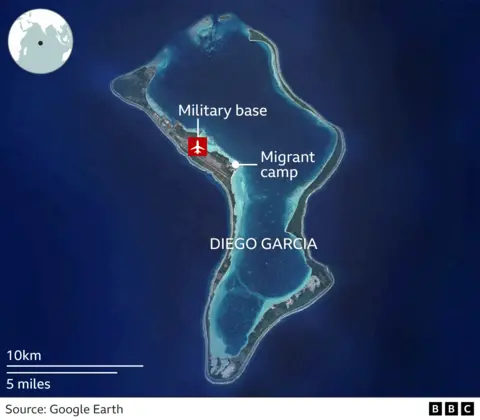
Migrants – both on the island and in Rwanda – whose claims for international protection have been approved, as well as families in the camp with children, are to be offered a transfer to a “safe centre” run by the United Nations in Romania while the UK government continues to search for a “durable solution” – migrants told the BBC.
They have been told they will remain in the centre in Romania for up to six months.
“Within those six months, the UK will continue to develop a durable solution for you in line with international standards. You can choose to accept any solution presented to you during this time. If you do not wish to accept any offers made during those six months, you will be brought to the UK,” letters from the Biot administration, seen by the BBC, say.
One man, currently in Rwanda, who has been offered the move to Romania described it as “a very big relief”. Another migrant there said it was the “happiest day in three years”.
Those who have had their protection claims rejected and are not part of family units within the camp have been offered financial incentives to return to Sri Lanka. According to a letter to migrants, seen by the BBC, this will include £3,000, medical insurance for three years, accommodation for up to three years, plus a job or training or education opportunities.
The BBC understands that those who have not had their protection claims approved have not yet exhausted all legal avenues. Lawyers representing the migrants are due to fly to Diego Garcia to meet their clients this week.
“I didn’t eat anything from the morning. I feel very depressed,” said one of the Tamils who has been treated for a mental health condition in Rwanda and has now been offered a return to Sri Lanka.
The first Tamils arrived on Diego Garcia in October 2021, saying they had been fleeing persecution and trying to sail to Canada to claim asylum when their boat ran into trouble and they were rescued by the Royal Navy. Their account was backed up by maps, diary entries and GPS data on board.
In the following months, more boats arrived.
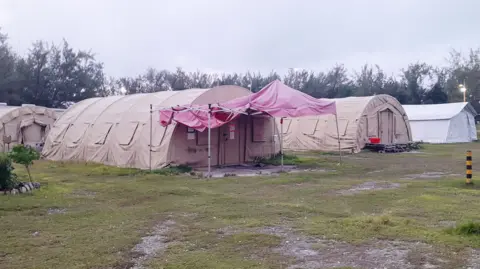
When the BBC visited the camp last month, men and women lined up against the six-foot fence and stood outside their tents waving.
The camp is made up of beige domed military tents used as accommodation, and white humanitarian tents that have been turned into makeshift communal rooms and a church.
Inside one of the tents, where about five or six men sleep, one man lifted a panel above his bed to reveal a nest of rats.
“Look, a leak. A rat hole,” another said as he pointed urgently around his tent, where sheets and towels were hung to create different rooms.
The Tamils have been given green military cots to sleep on but have stacked wooden pallets and flattened cardboard boxes on top in an effort to make them more comfortable.
Hand-written signs are hung in the camp with slogans such as “We are treated like animals in a cage” and “This is a bad place”.
Some showed off efforts to improve their living situation, including a dining table made of pallets, and plant beds lined with coconut husks.
Recently, an internal fence was erected splitting the camp between the single men there and families.
An independent social worker hired by one of the migrants’ lawyers described the situation in the camp late last year as an “emerging mental health pandemic”.
Outside the courtroom, men, women and children showed me signs of self-harm.
During the court visit to the camp, one woman wept as she alleged that her daughter had been assaulted by another migrant in the tent, one of several claims of sexual assault.
Three men, who have each been either charged or convicted of offences within the camp, are being held in a room next to the island’s police station.
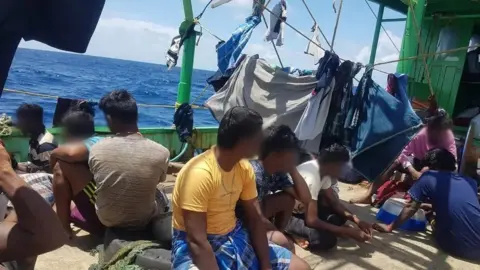 Handout
HandoutBoth United Nations and Red Cross representatives have previously raised concerns about the use of the camp and its conditions.
Following a visit late last year, the UN said the camp was “manifestly not appropriate” for people to live in long-term and raised particular concerns over reported sexual assaults and harassment of children by other migrants.
The chapel used to host the court hearing normally functions as a school. Educational posters were stuck on the walls alongside children’s drawings, one of which depicted a military tent with palm trees in the background.
A short drive away from the camp, there is accommodation for civilian contractors. Shops, bars, restaurants and leisure facilities, such as a bowling alley and cinema, are available to troops and contractors.
The Indian Ocean territory, located hundreds of miles away from any other population, is viewed as an important strategic base for the US.
Access to the island is heavily restricted and it has long been shrouded in rumour and mystery. The UK government has confirmed that two US rendition flights landed there in 2002 but says the detainees did not leave the planes.
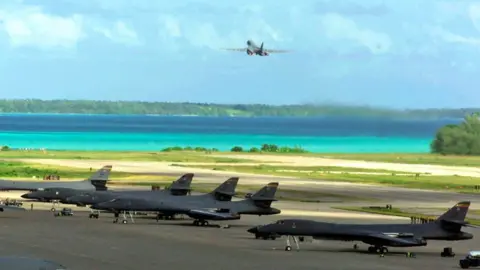 Getty Images
Getty ImagesUK government lawyers earlier this year opposed the BBC being granted access to the island to attend the hearing, but the Biot Supreme Court ruled in the BBC’s favour, saying that “justice must not only be done but must be seen to be done”.
The US – which controls most personnel and resources on Diego Garcia – later said it would block access to the BBC and lawyers representing the migrants. It also said it would withhold food, transport and accommodation from all those attending the hearing, including the British judge.
The US and British authorities later allowed the hearing to go ahead, but with restrictions in place. Additional G4S officers were flown over to guard the BBC and lawyers and ensure access around the island was restricted.
If they accept Tuesday’s offer, the stranded Tamils could face a 4,600-mile (7,500km) journey to Romania and more time in limbo, or the return to Sri Lanka.
Standing outside the courtroom alongside her parents last month, one 12-year-old girl said that since seeing a military aircraft pass over the camp, she had dreamed of being a pilot – so she too could fly away.


